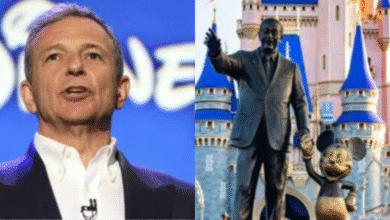Trump’s Tariffs Cause Sharp Decline on for Disney Company
Disney’s stock price is falling fast, and Trump is likely to blame.
Credit: Disney Dining
Related: Dream Big, Laugh Hard: Walt Disney’s Most Inspiring Words
Disney’s stock has taken a significant hit recently, reflecting broader trends in the market. Since the announcement of President Trump’s tariffs, Disney’s stock price plummeted nearly $6, marking a steep decline from the $96 point it began the week at. This decrease is particularly concerning for investors, especially given that just a month prior, the stock was valued over $10 higher, highlighting a rapid downward trend. In a yearly comparison, the drop is staggering; in April 2024, Disney shares traded at $117, emphasizing the dramatic fall in market value.
Recent stock performance reveals that Disney’s once-impressive climb to $122 in March 2025 faced devastating repercussions as profitability concerns grew alongside the tariff announcements. This precarious situation raises questions about how Disney will navigate through these turbulent financial waters, particularly when looking at its past stability and potential future.
The introduction of Trump’s tariffs has sent ripples through various sectors, with Disney being heavily affected. This tariff policy, launched in April 2025, has incited notable criticism and concern among market participants. With tariffs expected to increase costs significantly, Disney is projected to bear a substantial financial burden.
Market analysts speculate that these tariffs could reshape Disney’s operational costs. This includes everything from the production of merchandise to the impact on ticket prices at theme parks, as increased operational expenses may inevitably be passed on to consumers. The unexpected economic consequences pose a challenge for Disney, which had recently aimed to expand its offerings and attract visitors who may now be deterred by potentially higher costs.

Related: The Best Walt Disney World Resort Pools You Need to Visit
Experts have voiced their concerns regarding the current landscape. Many market analysts observe a palpable uncertainty surrounding Disney’s financial standing. They predict that these tariffs may compound the already-existing challenges Disney faces, heightening concerns about consumer spending habits. As families grapple with potential price hikes and reduced purchasing power, Disney’s usual draw may diminish.
The ramifications of Trump’s tariffs stretch beyond Disney, impacting the entire stock market. The S&P 500 witnessed one of its most significant single-day losses since 2020, tumbling nearly 4.84% following the tariff announcement. This downturn has left many investors unsettled, as the broader implications for American corporations surface.
With multiple sectors experiencing similar price drops, investors are beginning to recognize the interconnectedness of industries in the context of tariff policies. Companies that rely heavily on overseas production or materials are particularly vulnerable, leading to worries about the sustainability of profit margins across the board. Stakeholders are closely monitoring how these developments play out in the coming months, contemplating long-term strategies amid fluctuating stock values.
As the situation unfolds, the long-term effects on major companies like Disney could be profound. With projections indicating that the tariffs may lead to a reduced growth trajectory for many corporations, the road ahead appears bumpy. The ability to maintain competitive pricing while managing operational costs will be a critical focus for these companies.
The impact of Trump’s tariffs is likely to extend directly to consumers, affecting their purchasing power in a significant way. Reports suggest that families could see a decrease of around $4,000 in their purchasing abilities due to the increased costs incurred from tariffs. Such projections highlight an important aspect of economic policy; the trickle-down effect often shifts the burden from corporations to consumers, altering daily financial realities.
Certain products are expected to take harder hits than others. Specifically, the price of vehicles could increase substantially, with reports indicating that the cost of the average new car could soar by almost $3,700. Additionally, everyday items such as food might also see increases, placing further strain on household budgets. Families may need to reassess their spending habits and prioritize essential purchases in light of these anticipated price hikes.
Experts anticipate that, without substantial changes or countermeasures, the implementation of tariffs will lead to considerable economic hardship for consumers. Economists urge caution, suggesting that decreased consumer confidence could result in slowed economic growth, ultimately impacting everything from job creation to the stability of major corporations. With sound economic management, the hope exists that companies like Disney will adapt and find ways to soften the blow; however, the coming months will certainly be a test of resilience for many.
As Disney and the rest of the world grapples with the implications of Trump’s newly implemented tariffs, the entire economic landscape reflects a shared uncertainty among companies and consumers alike. Navigating these challenging times will require strategic foresight, adaptability, and perhaps even a dash of luck in an increasingly complex market environment.







Could it be that all the movies that Disney created are trash. Iger destroyed Star Wars , Marvel and all the classic movies. Could the high price tickets to the park, the lack of anything new at the park except for shows. Could be all the DEI garbage that Iger pushed. Could it be that no one is interested in Disney toys – just look at Ollie’s – that is where Disney toys go to die.
Wake up Disney is poorly managed and only trying to get as much money out of people as they can with as little effort.
Trumps tariffs just started, Disney has been garbage for years. The stock is garbage since Iger took over -anyone with half a brain would know that. The unsalable, overstocked toys are already here. Disney does not want manufacturering to return to the US so the can they can have the junk toys made by slave and child labor for Pennie’s and ask ridiculous prices in the stores or forget about the parks. Iger screwed it all up and it is his fault and no one else’s
This fool actually think he is going to run for politics.
How much Disney pay you to write this crap article